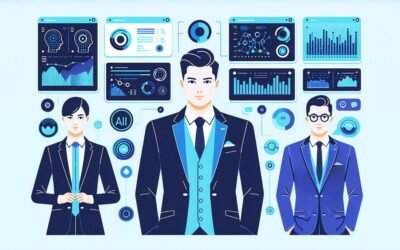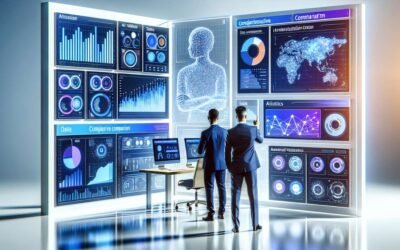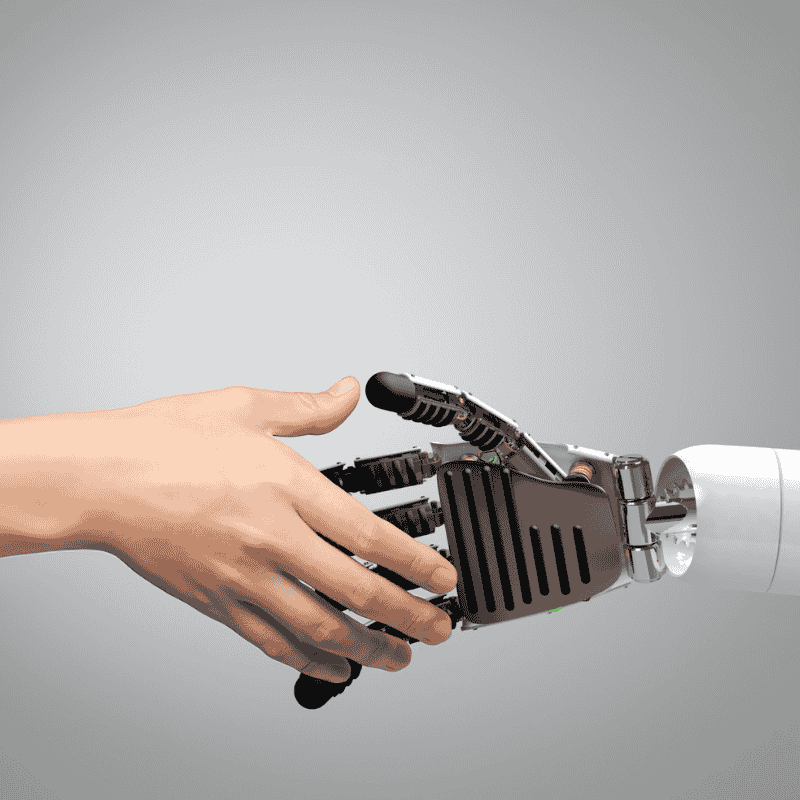As we step into 2025, the landscape of digital marketing is undergoing a profound transformation, largely driven by advancements in artificial intelligence (AI). The integration of AI technologies into marketing strategies is no longer a futuristic concept; it has become a necessity for businesses, especially small enterprises striving to compete in an increasingly crowded marketplace. AI offers innovative solutions that enhance customer engagement, streamline operations, and provide valuable insights into consumer behavior.
For small businesses, leveraging AI can mean the difference between thriving and merely surviving in a digital-first world. The importance of AI in digital marketing cannot be overstated. With the ability to analyze vast amounts of data quickly and accurately, AI empowers marketers to make informed decisions that resonate with their target audience.
From personalized customer experiences to predictive analytics, AI is reshaping how brands interact with consumers. As we delve deeper into the various facets of AI in digital marketing, it becomes clear that embracing these technologies is essential for small businesses looking to enhance their marketing efforts and drive growth.
Key Takeaways
- AI is revolutionizing digital marketing by enabling personalized customer experiences, content creation and optimization, predictive analytics, voice search, advertising targeting, and automation.
- Personalized customer experiences are made possible through AI’s ability to analyze data and provide tailored recommendations and interactions based on individual preferences and behaviors.
- AI-powered content creation and optimization tools help marketers create and distribute relevant and engaging content, as well as optimize it for better performance and audience engagement.
- Predictive analytics and decision making leverage AI to analyze large datasets and forecast future trends, enabling marketers to make data-driven decisions and optimize their strategies.
- Voice search and conversational AI are transforming the way consumers interact with brands, requiring marketers to optimize their content and strategies for voice-based interactions and search queries.
Personalized Customer Experiences
One of the most significant advantages of AI in digital marketing is its ability to create personalized customer experiences. In an era where consumers are inundated with information and choices, personalization has emerged as a key differentiator for brands. AI algorithms analyze user data, including browsing history, purchase behavior, and demographic information, to tailor marketing messages and product recommendations to individual preferences.
This level of personalization not only enhances customer satisfaction but also fosters brand loyalty. For instance, consider an online retail store that utilizes AI-driven recommendation engines. By analyzing a customer’s past purchases and browsing habits, the store can suggest products that align with their interests.
Moreover, personalized email campaigns powered by AI can significantly improve open and click-through rates, as recipients are more likely to engage with content that speaks directly to their needs and preferences.
AI-Powered Content Creation and Optimization

Content remains king in the digital marketing realm, and AI is revolutionizing how businesses create and optimize their content strategies. With tools that can generate high-quality written content, analyze keyword performance, and even suggest optimal posting times, AI is streamlining the content creation process. This allows marketers to focus on strategy and creativity while leaving repetitive tasks to intelligent algorithms.
For example, platforms like OpenAI’s GPT-3 can assist marketers in generating blog posts, social media updates, and product descriptions with minimal human intervention. Additionally, AI tools can analyze existing content to identify gaps in information or areas for improvement, ensuring that businesses consistently deliver valuable and relevant content to their audience. By optimizing content for search engines through AI-driven insights, brands can enhance their visibility and attract more organic traffic.
Predictive Analytics and Decision Making
Predictive analytics is another area where AI shines in digital marketing. By leveraging historical data and machine learning algorithms, businesses can forecast future trends and consumer behaviors with remarkable accuracy. This capability allows marketers to make data-driven decisions that align with market demands and customer preferences.
For instance, a small e-commerce business can use predictive analytics to identify which products are likely to be popular in the upcoming season based on past sales data and current market trends.
Armed with this information, the business can adjust its inventory and marketing strategies accordingly, ensuring they are well-prepared to meet customer demand. Furthermore, predictive analytics can help identify potential churn risks among customers, enabling businesses to implement retention strategies before it’s too late.
Voice Search and Conversational AI
As voice-activated devices become increasingly prevalent in households worldwide, optimizing for voice search has become essential for digital marketers. AI-powered conversational interfaces are changing how consumers interact with brands, making it crucial for businesses to adapt their strategies accordingly. Voice search queries tend to be more conversational and longer than traditional text-based searches, requiring marketers to rethink their SEO tactics.
To capitalize on this trend, businesses should focus on creating content that answers common questions in a natural language format. For example, a local restaurant might optimize its website for voice search by including FAQs about its menu, hours of operation, and reservation policies. Additionally, integrating chatbots powered by conversational AI on websites can enhance customer service by providing instant responses to inquiries, further improving the overall customer experience.
AI-Powered Advertising and Targeting

AI is revolutionizing advertising by enabling hyper-targeted campaigns that reach the right audience at the right time. Traditional advertising methods often rely on broad demographics, but AI allows marketers to segment audiences based on specific behaviors and preferences. This precision targeting not only improves ad performance but also maximizes return on investment (ROI).
For instance, social media platforms like Facebook and Instagram utilize AI algorithms to analyze user behavior and interests, allowing advertisers to create highly targeted ad campaigns. A small business selling eco-friendly products can leverage these tools to reach environmentally conscious consumers who have shown interest in sustainable living. By delivering relevant ads to the right audience, businesses can increase engagement rates and drive conversions more effectively.
Automation and Efficiency in Digital Marketing
The integration of AI into digital marketing also brings about significant automation benefits. Routine tasks such as email marketing campaigns, social media posting, and data analysis can be automated using AI tools, freeing up valuable time for marketers to focus on strategic initiatives.
For example, marketing automation platforms like HubSpot or Mailchimp utilize AI algorithms to optimize email campaigns based on user behavior. These platforms can automatically segment audiences, personalize content, and schedule emails for optimal delivery times. As a result, small businesses can maintain consistent communication with their customers without overwhelming their teams with manual tasks.
Ethical Considerations and Challenges of AI in Digital Marketing
While the benefits of AI in digital marketing are substantial, it is essential to address the ethical considerations and challenges that come with its implementation. As businesses increasingly rely on AI technologies, concerns about data privacy and security have emerged. Consumers are becoming more aware of how their data is collected and used, leading to heightened expectations for transparency from brands.
Moreover, there is a risk of bias in AI algorithms that could lead to discriminatory practices in advertising or content delivery. Marketers must ensure that their AI systems are designed with fairness in mind and regularly audited for potential biases. By prioritizing ethical considerations in their use of AI technologies, businesses can build trust with their customers while navigating the complexities of digital marketing in 2025.
In conclusion, the integration of AI into digital marketing is not just a trend; it is a fundamental shift that small businesses must embrace to remain competitive in 2025 and beyond. From personalized customer experiences to predictive analytics and automation, AI offers a wealth of opportunities for enhancing marketing strategies. However, it is crucial for businesses to approach these technologies ethically and responsibly.
As you consider how to incorporate AI into your marketing efforts, take the time to explore the various tools available and assess how they align with your business goals. Embrace the future of digital marketing with confidence—your customers will thank you for it!
In a related article on TechnoBelieve, a case study is presented that highlights the impact of AI on digital marketing strategies. The case study delves into how a company utilized AI tools to optimize their Google Ads campaigns and improve their website design for better user engagement. This real-world example showcases the tangible benefits of incorporating AI into digital marketing efforts, aligning with the predictions for AI’s transformative role in the industry by 2025. To learn more about this case study, you can visit here.
Get a Free Customized AI Marketing Strategy
FAQs
What is AI?
AI stands for artificial intelligence, which refers to the simulation of human intelligence in machines that are programmed to think and act like humans.
How is AI transforming digital marketing?
AI is transforming digital marketing by enabling more personalized and targeted marketing campaigns, improving customer experience through chatbots and virtual assistants, and providing valuable insights through data analysis and predictive analytics.
What are some AI technologies used in digital marketing?
Some AI technologies used in digital marketing include machine learning, natural language processing, predictive analytics, and chatbots.
How does AI improve customer experience in digital marketing?
AI improves customer experience in digital marketing by providing personalized recommendations, 24/7 customer support through chatbots, and efficient handling of customer inquiries and complaints.
What are the benefits of using AI in digital marketing?
The benefits of using AI in digital marketing include improved targeting and personalization, increased efficiency and productivity, better decision-making through data analysis, and enhanced customer experience.






0 Comments